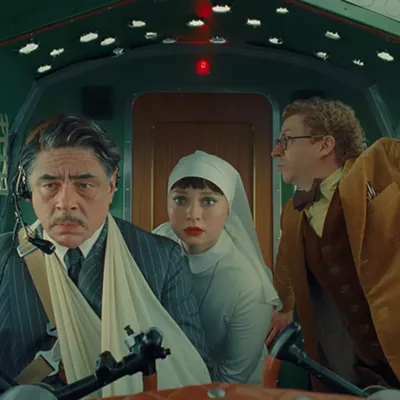A leg floats in a pale blue sky, dangling from a parachute. Now a shot across a desert, and there are dozens of these legs dropped from on high. And in the slightest of slow motion, across the desert sands, one-legged amputees rush, hobble, bound toward these offerings.
A typical image from Mohsen Makhmalbaf's gorgeous, surreal but all-too-real Kandahar, the story of an Afghan woman's return to her homeland while the Taliban are still in power. Makhmalbaf is one of the great contemporary Iranian filmmakers, and while recognized in larger cities, his latest feature has made its way across the U.S. largely because of its sadly fortuitous topicality and the fact that it the dialogue is largely in English.
Nafas (which means "respiration" in Afghani) is a female journalist who was born in Afghanistan, but she fled the country as a teenager to make a career in Canada. She receives a letter from her sister, who has been maimed by a land mine. Depressed over her fate and the systemic oppression of women in Afghanistan, she vows to commit suicide at the time of the next solar eclipse. The clock is ticking: that's three days away, and Nafas must assume the head-to-toe covering of the traditional burka for her journey to the city that is the headquarters of the Taliban government.
Nafas records her thoughts on a tape recorder, offering explanation for the goings-on we see unfold around her, the thoughts that stir beneath the brightly colored fabric of her garment. She must also forfeit the independence she knows as a woman in the Western world. It's illegal for women to travel alone, so she must seek the help of Afghanis along the way, including a young boy who is already an accomplished con artist and an African-American doctor who reveals that his beard is in fact a disguise, a covering, like Nafas' burka. The burkas are like peacock plumage, remarkably ornate and richly colored, and when we are given glimpses beneath the coverings, we discover that women are hiding forearms festooned with bracelets, crimsoned lips and carmine nails.
Makhmalbaf works with non-actors, like many Iranian directors. Yet the power of his imagery overcomes the uncertainty of some of the performances in English. While a clock is ticking, Makhmalbaf is not one to make melodrama when the emotional authenticity of faux-documentary is at his disposal.
"The reality of Afghanistan is surreal in itself," Makhmalbaf has claimed. He's made films about Afghani refugees in Iran since 1987's The Cyclist, which is on Facets Video, like the bulk of his work. Cities don't exist. Rubble marks where larger rubble once stood -- and Kandahar was shot before the U.S. raids that began in the fall. Almost three million people have died in Afghanistan in the last 20 years, and another six-and-a-half million are refugees. By Makhmalbaf's count, that constitutes 40 percent of its population.
Yet Makhmalbaf's didactic moments are few and forgivable. His visual sense is lyrical and sure, and his passages of dialogue often poetic, if weary. As in his earlier Gabbeh, a semi-narrative about the weaving of brightly colored, traditional Persian carpets, he proves himself a master of the ambiguous image, displaying beauty in a fashion that does not immediately yield meanings or strain for glib conclusions.
He recently completed a digital video short, Afghan Alphabet, a 40-minute documentary about pre-teen girls attending classes as refugees in Northern Iran, who still fear the god presented by the Taliban and are reluctant to peer even slightly from under their burkas.
"This is a whole culture," Makhmalbaf says of this short. "When a nine-year-old girl is petrified that she might burn in hell if she were to tell her name and unveil herself in front of a strange man, how can you change her without bombing her? She needs to be educated."
Kandahar is a straightforward yet beautiful meditation on one more aspect of the world we remain not only ignorant of, but hardly able to imagine.

















